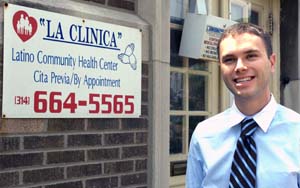Ray Mailhot doesn’t know exactly where he’ll be after Commencement, but he knows it will somehow involve his two biggest passions — medicine and community service.
The Birmingham, Ala., native is graduating this week with an Arts & Sciences double major in biology and Spanish and minors in biophysics and applied linguistics.

After he graduates, Mailhot plans to attend medical school at either the Washington University School of Medicine or Johns Hopkins in Baltimore. He’s interested in oncology but wants to keep his options open so he doesn’t miss out on another specialty he might enjoy. He also plans on doing a lot of community work.
Though his interest in medicine began in middle school, it didn’t blossom into a passion until Mailhot began to volunteer at La Clinica medical clinic in South St. Louis his freshman year.
La Clinica aims to ensure access to high-quality health care for St. Louis-area Latino immigrants and refugees who are underinsured or uninsured.
“I’ve really enjoyed working there during my four years here,” Mailhot says. “Though my responsibilities changed quite often, I was mainly involved in triage work and translating.”
But his involvement deepened after Mailhot was awarded the 2007 Kaldi’s Social Change Grant from the Office of Community Service. The grant provides $5,000 for an undergraduate student to develop and implement an innovative community project.
Mailhot saw the grant as a perfect opportunity to help educate the St. Louis Hispanic community on the dangers of diabetes.
“Unfortunately, diabetes is having quite an adverse effect on the Hispanic community,” Mailhot says. “It has been predicted that, by 2020, the rate of diabetes in the Hispanic population will have increased by around 300 percent. I realized I really wanted to focus my project on the education and prevention of the disease.”
Because of his medical background and fluency in Spanish, Mailhot already had been giving talks at various locations on behalf of La Clinica on diabetes and its prevention. For the first phase of his project, he needed to assess exactly how the community is being affected by diabetes.
“I conducted surveys at La Clinica to assess the prevalence of the disease among the Hispanic community in South St. Louis, as well the amount of pro-diabetic behaviors like smoking, diet and lack of exercise,” he says.
|
College of Arts & Sciences |
He knew that he wanted to develop a long-term program that would hopefully decrease pro-diabetic factors and the prevalence of the disease itself. During the summer, a Hispanic health fair at a Spanish church in St. Louis presented a great op-portunity.
“Organizers of the fair contacted me through La Clinica to speak about diabetes, take blood pressure readings and answer questions,” Mailhot says. “It seemed like the church community was the perfect one around which to develop the second and third phases of my project. I decided to start a series of discussions in which doctors, health behavior experts, dieticians and psychologists would speak about the effects of diabetes related to their specific fields. We had 12 weekend sessions, which were quite successful.”
Mailhot, whose mother is from Honduras and father’s family is from Quebec, Canada, also was heavily involved in the Association of Latin American Students, serving as president his junior year.
An Annika Rodriquez Scholar, Mailhot is serving his second year as residential adviser in Mudd Residential College.
He was inducted last year into the Phi Beta Kappa national honorary fraternity. He also has served as a choreographer and dancer for Carnaval and Diwali.
But working with those in need continues to be his most focused passion.
“In addition to his work at La Clinica, Ray has spent several winter breaks in Honduras helping provide medical care to communities in need,” says Julia Macias Garcia, coordinator of the Rodriguez Scholars program.
“He is a very caring individual who goes above and beyond in taking care of his community. The entire WUSTL community has benefited from his time here” she says.